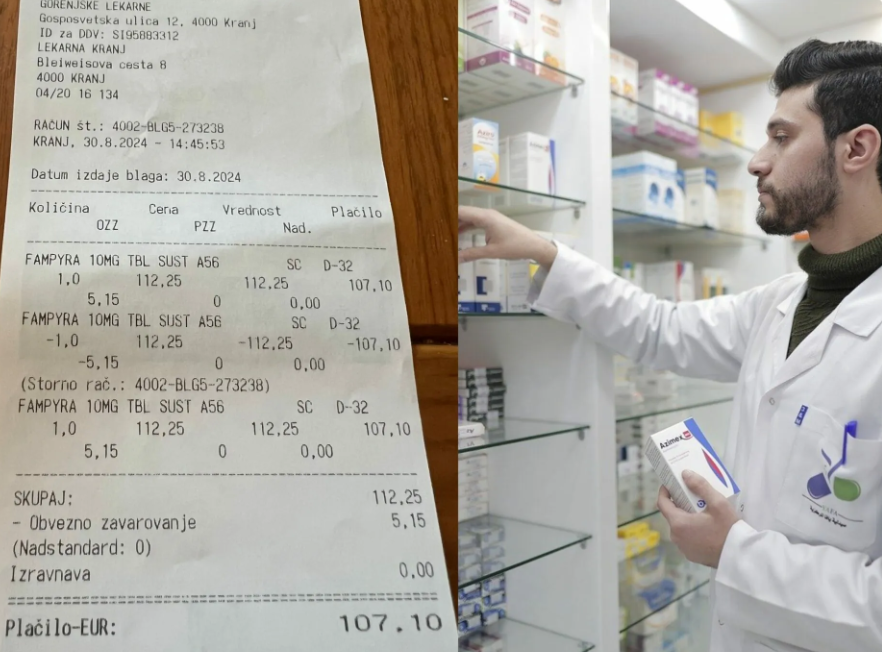“Today, I paid 107 euros at the pharmacy for medicine without which I have trouble walking. Because it is now considered to be a higher standard. I have been in regular employment and have been contributing fully to the healthcare budget for more than 20 years,” wrote one frustrated user with multiple sclerosis on the social network X. She says she would like to walk at least approximately normally: “At least at work.”
Although the government promised to abolish supplementary health insurance, this turned out to be a misleading promise, as the Government of the Republic of Slovenia has not abolished supplementary health insurance. Instead, it converted it into a compulsory health contribution, which is identical in amount and content. This is why many people are all the more disappointed that, in addition to all this, we often have to pay extra to buy medicines that are urgently needed.
The insurance company has put the medicine on the payable list
The lady who had to pay an extra 107 euros for her medication at the pharmacy received the following comment from another X user: “I know the doctor could have indicated when she gave you the prescription that this is the only possible medicine for you and that it has no alternative, and then you would not have had to pay for it.” She replied: “She says she did. But the pharmacist said that the insurance company has put this medicine on the payable list. Just like that.”
Another X user pointed out the belief that “they have come a long way from complementary to MANDATORY + monthly.” Every employee contributes to the Health Insurance Institute of Slovenia (ZZZS) through a health contribution that is taken from their salary. He asked where all this money was going. “But that’s what we citizens now have above – #BILLS to pay for medicines. All the money is intended for NGOs, LGBT, illegals, socialists,” he added critically. A frustrated lady, who had paid more than a hundred euros extra for her medicines, commented approvingly: “Exactly. I feel it in terms of my income …” She also pointed out that when one finds oneself in such a situation, one pays if one can. “100 euros every month with full insurance and a diagnosis of multiple sclerosis – horrible and unacceptable. And it changed just like that, from today to tomorrow. Complete chaos. The doctor says – it’s a mistake!!! Yep, I paid 100 euros for a ‘mistake,’ and what good does that do me?” One follower commented, “According to the information from the Central Register of Medicines (http://cbz.si), it is not a mistake – unfortunately, the price of the surcharge is the right one.”
One follower asked if she had been told about the possible free substitute medicine, which should be just as effective, adding, “They usually forget, but they should have told you. But it’s a shame when it changes nonstop, and you don’t tolerate all medicine the same.” To this, the lady with multiple sclerosis explained that she had been told that, unfortunately, there was no substitute medicine in her case. “There is no substitute medicine – that’s what they said. So, this is an extremely unusual measure. It’s complete chaos on the shoulders of the regular payer/the insured,” she explained.
On the website of the Health Insurance Institute, the following information is available on the co-payments for medicines:
“SURCHARGES FOR MEDICINES
What is the cheapest medicine?
If a generic medicine is prescribed, the cheapest medicine is dispensed. If there is no medicine available on the Slovenian market from the list of interchangeable medicines within the maximum recognised value, another medicine with the lowest price may be dispensed without a surcharge. This does not apply if the medicinal product on the list of interchangeable medicinal products is included in a therapeutic group of medicinal products, in which case the surcharge cannot be avoided.
When is a surcharge required for medicine?
If a prescription is for a medicinal product from a group of interchangeable medicinal products or from a therapeutic group of medicinal products with a specific maximum recognised value and the prescribed medicinal product has a higher price than the maximum recognised value. Due to the way the maximum recognised value system works, the possibility for manufacturers to adjust the prices of medicines and the different stock levels in pharmacies, sometimes the same medicine may require an extra charge and sometimes not. The surcharge may change with each dispensing of the medicine. When a surcharge is required, we suggest that you ask the pharmacy if they can replace the prescribed medicine with a medicine without a surcharge. This may not always be possible. If you are not prepared to pay the extra charge, we suggest that your doctor prescribes the medicine that is available without a surcharge.”
Many were shocked by the lady’s post, as they responded with many telling comments, such as:
– “This is criminal.” – “I am so sorry for you.” – “In a year or so, they’ll introduce a third insurance, supposedly voluntary! In Slovenia, greed is endless, and justice is minimal!” – “SHAME on you, the Government of the Republic of Slovenia, that you should cheat the nation like this, especially those most vulnerable. You abolished supplementary health insurance, fixed compulsory health insurance at 35 euros, and now you are covering the difference like this? We really are sinking via Venezuela! Or is this just a quick euthanasia by Golob?” – “Let me reassure you: the health reform is already underway. Don’t take my word for it, the Minister says so.” – “As of the 24th of July 2024, many medicines have been made payable. I went to get my mother her medicine for blood pressure, and there is now a surcharge of 5 euros.” – “A health reform under Jenull and Keber is already showing results. They are well on the way to privatising healthcare.”
S. K.


